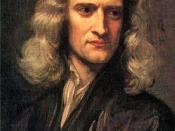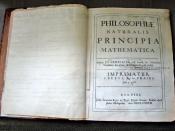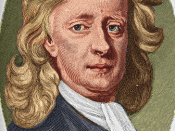Sir Isaac Newton was born on January 4, 1643, in the manor house of Woolsthorpe, near Grantham, Lincolnshire, England. Newton came from a family of modest yeoman farmers. His father died several months before he was born. His mother remarried and moved to a nearby village three years later. She left Isaac in the care of his maternal grandmother. Upon the death of his stepfather in 1656, Newton's mother removed him from grammar school in Grantham in hopes of training him to manage her now much enlarged estate, but even then Newton's interest ran more toward books and mathematical diversions. His family decided that he should be prepared for the university, and he entered Trinity College, Cambridge, in June 1661.
Even though instruction at Cambridge was still dominated by the philosophy of Aristotle, some freedom of study was permitted in the student's third year. Newton immersed himself in the new mechanical philosophy of Descartes, Gassed, and Boyle; in the new algebra and analytical geometry of Vista, Descartes, and Wallis' and in the mechanics and Copernican astronomy of Galileo.
During this stage of time, Newton did not showed much great talent. His scientific genius emerged suddenly when the plague closed the university in the summer of 1665 and he had to return to Lincolnshire. Within the 18 months he is in Lincolnshire Newton began revolutionary advances in mathematics, optics, physics, and astronomy.
Optics
Newton's initial lectures as Lucasian Professor dealt with optics, including his remarkable discoveries made during the plague years. He had reached the revolutionary conclusion that white light is not a simple, homogeneous entity, as natural philosophers since Aristotle had believed. Newton did a simple experiment on the light by using a glass prism and passed a thin beam of sunlight through it. He noticed the spectrum of colors-...


